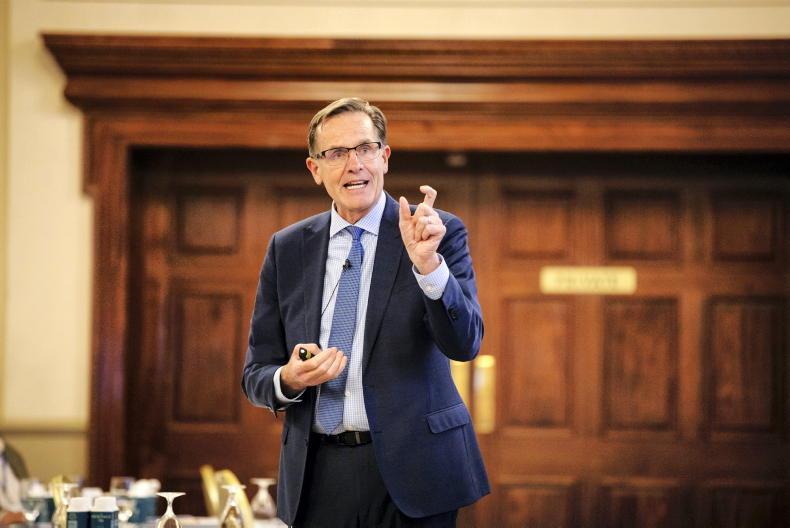US Economist Dan Basse was speaking at the Barnett Hall Conference last week. The owner of AgResource Company covered everything from corn prices to robots to weather predictions to try and explain some of what is happening in world markets at present.
He told the room that “we’re looking at flat grain markets”.
He said of course there will be bumps and spikes along the way, but overall markets will be flat according to Dan’s predictions in the coming months.
He also noted people will need to take advantage of those bumps and spikes in the market to sell their grain.

One thing that kept coming up was corn from maize.
Dan said corn prices have been down and while grain production came down slightly in the Black Sea and Europe overall it is a very good year for grain production and he explained that this is why prices are at their lowest in four years.
However, there are things to look out for.
A La Nina weather pattern is forecast which would bring drought conditions to Argentina, South Africa and the US in 2025.
This brings adverse conditions for grain production which could hit supply.
For example, on average a La Nina weather pattern brings Argentine maize and Brazilian Safrihna maize corn yields down by about 10% according to Dan.
That Safrinha maize crop in Brazil is known as the tiny maize crop, but is actually the biggest crop and has a big impact on world maize production.
Brazil is a major player in world trade. Dan said the planted area in the country is expected to increase by 2-3% in 2025. The country is adding 20-25m tonnes of row crop production every year according to the economist.

Dan predicted that the primary weather risks into 2025 are the Black Sea, eastern Europe, Western Canada and Brazil. So, they are things to keep an eye on.
Russia’s productivity is gaining similar to Brazil Dan commented, and said that this is adding to a world grain surplus. He said Russia is the world’s largest wheat exporter.
“The wheat market still may have the best opportunity longer term based on export stocks being low longer term,” he said.
Grain prices are at four-year lows, but input costs have remained high and farm incomes have been hit badly. Irish farmers are very familiar with this.
Dan described some figures on US farm incomes which showed a 14-34% decrease in incomes in two years.
The average change in income for all farm businesses in the US was a decrease of 27%.
Farm incomes struggling
Farm incomes around the world are struggling in the same way as they are on tillage farms in Ireland.
Dan noted how profit margins are falling with sinking grain values and high costs.
He said that grain farmer margins in the northern hemisphere are the lowest they have been since the harvest of 2016.
US farmers have cut their planted area by 3m acres.
Total net farm income dropped by $71bn (€65bn) over two years in the US since 2022.
That’s a drop of 37% and is the largest two-year decline on record.
Dan noted that farms have gotten bigger in America and this is causing serious mental health issues as farmers struggle to deal with this drop in incomes on their own.

Interestingly Dan noted that while labour costs or spend is reduced according to the United States Department of Agriculture investment in agricultural capital investments are increasing. He said robots and AI are playing a bigger part in agriculture.
US corn and soy area has now stagnated at around 178-180m acres each year.
He explained that if more supply is going to come from the US it will have to come from yield.
Dan commented that the only thing keeping the wheels on the bus in America is that farmland values have not come down.
Warm summer
This year yields are exceptional in the US. Dan noted it was the second warmest summer on record from June to August in the US.
In the central part of the US the heat was temperate and this is giving record yields of 300bu/ac on corn and 90bu/ac for soybeans.

Dan said the US is now up to its highest stock levels since 2019.
High stocks mean low price, but he said the price is still at the same level as 2019.
The new CEO of Barnett Hall Charlie McAllister introduced himself to customers at the company’s conference last week.
McAllister recently took over the top job at the grain buyer and animal feed importer.
He comes from Donegal and has spent the past six years in the US with Kerry and also has Dairygold Co-op, Diageo and Unilever on his CV.
In short
You can hear more from Dan on this week’s Tillage Podcast put online at 4pm on
Thursday.
